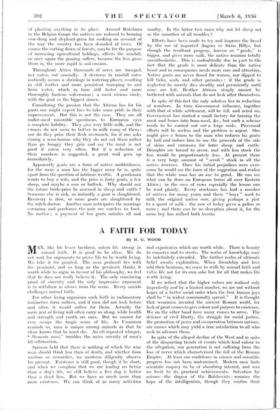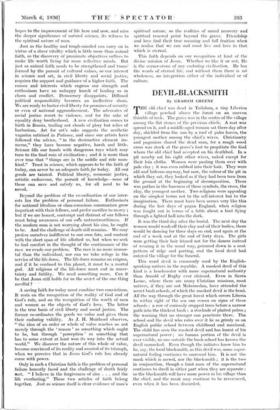A FAITH FOR TODAY
By H. G. WOOD
MAN, like his lesser brethren, enters life strong in animal faith. It is good to be alive. We do not wait for arguments to prove life to be worth living. We take it for granted. The onus probandi lies with the pessimist, and so long as the pessimist thinks it worth while to argue in favour of his philosophy, we feel that he does not really believe it. The only convincing proof of sincerity and the only impressive argument is to withdraw in silence from the scene. Every suicide challenges animal faith.
For other living organisms such faith in rudimentary instinctive form suffices, and if men did not look before and after, it would suffice for them. Actually the mere zest of living will often carry us along, while health and strength and youth are ours. But we cannot for ever escape the tragic • sense of life. As Unamuno reminds us, man is unique among animals in that he alone knows that he must die. An oft-repeated whisper, "..11emento mori," troubles the naive serenity of man's life-affirmation.
Spinoza held that there is nothing of which the wise man should think less than of death, and whether from wisdom or cowardice, we moderns diligently observe his precept. Existence is still good, though it be short, and when we complain that we are leading no better than a dog's life, we still believe a live dog is better than a dead lion. But we have so much more than mere existence. We can think of so many activities and experiences which arc worth while. There is beauty to conserve and to create. The realm of knoWledge may be indefinitely extended. The further realm of ultimate belief awaits exploration. When friendship and love add their benisons, we cease to walk by animal faith and value life not for its own sake but for all that makes life worth living.
If we reflect that the higher values are realised only imperfectly and by a limited number, we arc not without hopes of a better social order when the best human joys shall be " in widest commonalty spread." It is thought that weariness invaded the ancient Roman world, for lack of great causes to give colour and purposeto existence. We on the other hand have many causes to serve. The defence of civil liberty, the struggle for social justice, the promotion of peace and co-operation between nations, are causes which may yield a true satisfaction to all who seek to advance them.
In spite of the alleged decline of the West and in spite of the disquieting trends of events which lend colour to the allegation, our generation is not suffering from the loss of nerve which characterised the fall of the Roman Empire. At least our confidence in science and scientific progress has not been undermined. Modern man finds scientific enquiry to be of absorbing interest, and sees no limit to its practical achievements. Salvation by science—the dogma of the Bolshevists—remains the hope of the intelligentsia, though they confine their hopes to the improvement of life here and now, and miss the deeper significance of natural science, its witness to the spiritual nature of man.
Just as the healthy and tough-minded can carry on in virtue of a sheer vitality which is little more than animal faith, so the: discovery of proximate objectives suffices to make life" worthliving for more reflective minds. But just as animal faith needs to be strengthened and trans' formed by the pursuit of cultural values, se' our interest' in science and art, in civil liberty and social justice; requires the support and guidance• of a higher faith. The causes and interests which engross our strength and enthusiasm have an unhappy knack of landing us in chaos !and conflict. Democracy disappoints: Diffused political responsibility becomes an ineffective sham. We are ready-to barter civil liberty for promises of security or even of national aggrandisement. The advocates of social justice resort to violence, and for the sake of equality deny brotherhood. A new civilisation comes to birth in Russia, trailing not clouds of glory but relics of barbarism.? Art for art.'s sake suggests the aesthetic vagaries satirised in Patience, and since -our artists have followed the advice, • " in the destructive element im- merse," they have become negative, harsh and little. Science fills our hands with dangerous toys which may turn to the final ruin of civilisation ;• and it is 'more than ever true that " things are in the saddle and ride man- kind." Trust in science, which appears to be the faith of today, can never be an adequate faith for today. All our goods are tainted. Political liberty, economic justice, artistic endeavour, the -pursuit of knowledge—none of these can save- and satisfy us, for all need to be saved. • BeyOnd the problem of the co-ordination of our inter- ests lies 'the' problem of personal- failure. Enthusiasts for national idealism or class-conscious communism grow impatient with their fellows, and prefer sacrifice to mercy ; but if we are honest, contempt and distrust of our fellows must bring awareness of our ovin untrustworthiness. If the modern man is not worrying about his sins, he ought to be. And the challenge of death still remains. We may profess ourselves indifferent to our own fate, and content with the short span of life allotted us, but when we seek to find comfort in the thought of the continuance of the race we evade our problem. The race is no more immor- tal than the individual, nor can we take refuge in the service of the life-force. The life-force remains an enigma, and if it be confined to this planet, it must be a mortal god. All religions of the life-force must end in uncer-. tainty and futility. We need something more. Can it be that Jesus still holds for us the secret of the one thing needful ? - A saving faith for today must combine two convictions. It rests on the recognition of the reality of God and of God's rule, and on the recognition of the worth of men and women as the objects of God's love. The latter is the true basis of civil liberty and 'social justice. The former co-ordinates the goods we value and gives them their enduring validity. As J. H. Muirhead observes, " the idea- Of an order or whole of value reaches us not merely through the ' reason ' as something which ought to be, but through ' perception ' as something that has to some extent at least won its way into the actual world." We 'discover the nature of this whole of value, become Convinced of its reality and assured of its triumph, when we perceive that in Jesus God's rule has already. come with power. Only in such aChristian faith is the problem of personal failure honestly faced and the challenge of death fairly met. " I believe in the forgiveness of sins . . . and the life everlaSting." These two articles of faith belong together. JUst as science itself is clear evidence of man's spiritual 'nature; so the realities of moral recovery and spiritual renewal point beyond the grave. Friendship and love find their true Meaning and! full fruition • what we realise that we can and must live and love in that which is eternal.
This" faith depends on our recognition at leaSt of the divine mission of Jesus. Whether we like it Or net; He is the corner-stone of any enduring civilisation. He hai the words of eternal life, and without them there is rid wholeness, no integration either of the individual or of culture.

















































 Previous page
Previous page